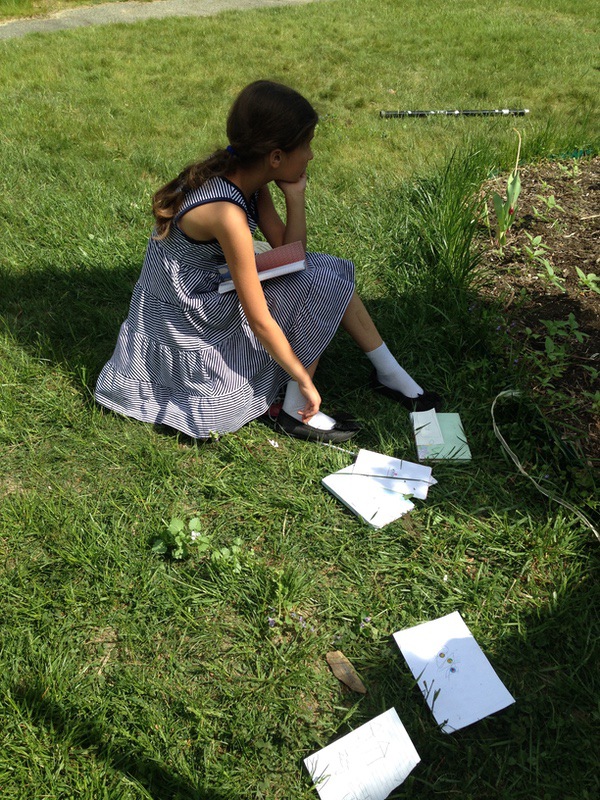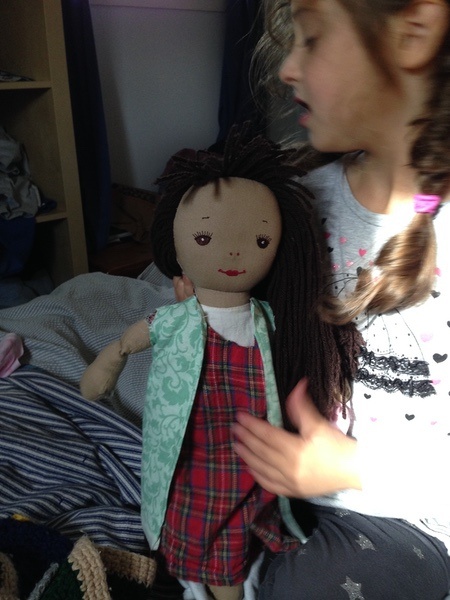This afternoon I took Bella out to play while Sophia was having her nap. I sat in a chair on the porch while Bella wandered around, up and down the porch steps, playing in the pots full of dirt, pushing her wagon around, and waving sticks in the air. At one point she had a long stick, almost as tall as she is, and was waving it uncomfortably close to me. Just as I admonished her to watch out, she whacked my arm. I took the stick from her and tossed it off the porch and into the grass. She flung herself down on the porch and screamed.
“Well,” I said, “I told you to be careful and you hit mama. That hurt me. If you can’t be careful, the stick has to go. You still have the short stick.” But she eventually went down and retrieved the longest of the three pieces that her stick had broken into when it landed.
And some time later she was right back on the porch, waving it about again. And just as I was warning her, the stick flew up and hit her on the forehead. She got a stunned look on her face. Then she marched over to the porch steps and threw the stick down onto the sidewalk, as if to say: Take that! Because, of course, it was the stick’s fault.







The lines you quoted are the same as those used in the traditional Anglican (Episcopal) 1928 Book of Common Prayer. One way to confirm is to see if, as in the 1928 pray, it omits the word Holy: “I believe one Catholic and Apostolic Church”.
“I believe one Catholic and Apostolic Church”
Yep, that’s what it says. I rather suspected it was the Anglican version. Still to my mind a great deal more beautiful than the banal version we American Catholics say, which not only lacks the elegance but also improperly translates “credo” as “we believe.” Ugh.
Now can you (or anyone else) tell me why do they omit the word “holy”?
This is a translation error. When the traditional translation into English was made in the 1500’s, the oldest available Greek manuscript of the Creed omitted the word “holy”. The translators mistakenly supposed that it was a later addition. Modern Anglican translations include the word “holy”, but some of the more traditional versions, including the one used in the 1928 Book of Common Prayer, do not.
Traditional Anglicans recognize it as a mistake, but seem to be slow to revise the prayer. Perhaps because once you start updating things, it is hard to stop at one word.
I grew up with the 1928 BCP creed (prior to my conversion to the Byzantine Catholic Church a few years ago), and I still find the old Anglican version far more beautiful than the one used in Roman rite churches today.
Keith,
Thank you very much. That’s very interesting. I can understand the reluctance to revise the prayer, when one has grown up with a prayer said a certain way, it can be hard to change. And I can see how changing one word might lead to a complete revision, which would be a shame.
I love all of Pauline Baynes books. My son took them at a very young age (like Bella). “The Song of the Three Holy Children” is one of our favorites. Much of her style in her religious books remindsme of illuminated manuscripts, which I just love. “In the Beginning” is also wonderful.
Thanks, Jenn, I’ll have to check them out. Sadly, it seems the two you mention are out of print, though used copies are available on amazon.
Oh, I’m sorry. I always seem to be attracted to OOP books, but since it’s so easy to track down copies on bookfinder (and cheaper than new sometimes) it doesn’t really bother me.
Oh not really a problem, I buy very few books at all. Mostly I swap via Book Mooch. When I do buy, it’s almost always with an amazon gift cert. And then I buy about 50/50 used and new. But I’m always sad to see that good books are OOP just on general principle.